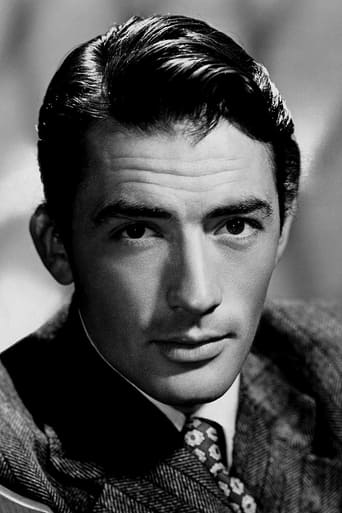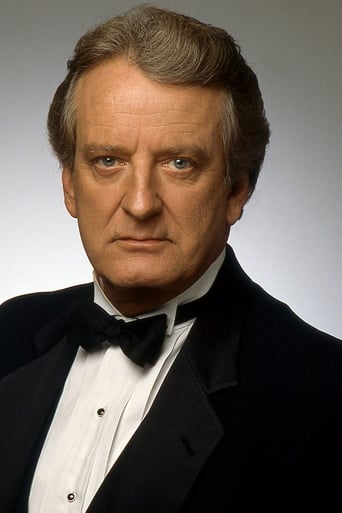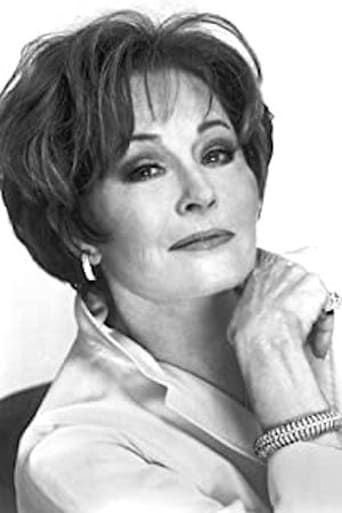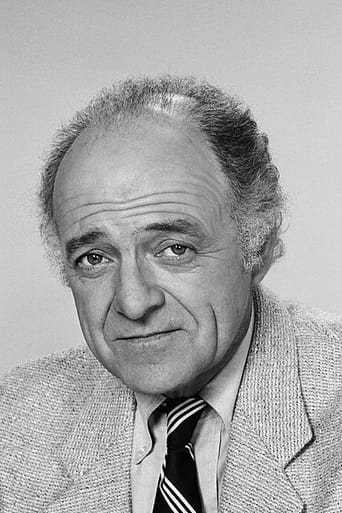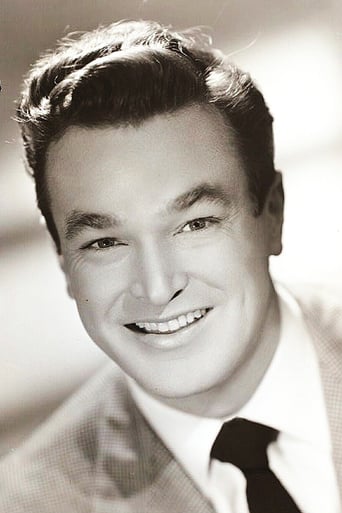Beanbioca
As Good As It Gets
Bea Swanson
This film is so real. It treats its characters with so much care and sensitivity.
Aneesa Wardle
The story, direction, characters, and writing/dialogue is akin to taking a tranquilizer shot to the neck, but everything else was so well done.
Mathilde the Guild
Although I seem to have had higher expectations than I thought, the movie is super entertaining.
gerdeen-1
History buffs will find plenty to quibble with in "MacArthur." Like a lot of World War II movies, it has its share of minor errors. And American military enthusiasts are certain to have strong opinions on Douglas MacArthur already, which will affect their views of the film.But all in all, I think this is a remarkably balanced look at an extremely controversial person. For those who know little about MacArthur, it's a good place to start. He was a larger-than-life figure, and in this film you can see both why he was revered and why he was despised.Although MacArthur came of age in the 19th century and became a general in World War I, this movie focuses on his high and lows in World War II and the Korean War. During that time he was an iconic figure. "Iconic" is an overused word, but it applies to him. With his trademark hat and corncob pipe, plus his curiously old-fashioned way of speaking and his instinct for controversy, he was unmistakable and larger than life.During the late 1970s, the post-Watergate era, traditional war pictures were no longer in vogue. "M*A*S*H," the mildly pacifist TV series set in the Korean War, treated MacArthur as a rather silly figure. But this movie, made in 1977, takes the man seriously, while showing his flaws clearly. It also is more frank than most classic films about how little consensus there is in warmaking. Leaders quarrel and connive while making policy, and the most loyal grunts are often dismayed at the decisions that put them in harm's way.Gregory Peck is excellent in capturing the complexity of Douglas MacArthur. Peck was an outspoken political liberal, and one has to assume he was no admirer of the unabashedly right-wing MacArthur. But he takes on the man's persona admirably.After heaping so much praise on "MacArthur," I must admit it is not great cinema. It's more interesting than moving. But if you're under 50 and know Douglas MacArthur only as a name in the history books, this will be an eye-opener. Like any good introduction to a subject, it should encourage you to seek other information and form your own opinions about the man and his times.
DavidB-7
This is a sound and thoughtful performance by Peck, who was saddled by a Ciceronian script, some of it presumably emanating from MacArthur himself.MacArthur's conviction that war is a great evil is convincingly portrayed, as is the relish of a general doing the only thing for which he was trained: the prosecution of war to the utmost severity.The real heroes of this movie are the politicians. Not just Roosevelt, but also the caricature of Truman, and the never seen or heard Eisenhower (a good clerk according to Peck's MacArthur). This movie reminded me that it is as important for a politician to compromise as for it is a general to combat.MacArthur's greatest opportunity was to become military ruler of a defeated Japan, for 3 years. It appears that he seized this to some good effect. He later claimed that:"The Japanese people since the war have undergone the greatest reformation recorded in modern history. With a commendable will, eagerness to learn, and marked capacity to understand, they have from the ashes left in war's wake erected in Japan an edifice dedicated to the supremacy of individual liberty and personal dignity, and in the ensuing process there has been created a truly representative government committed to the advance of political morality, freedom of economic enterprise, and social justice."In this one seems to hear the tone of a general boasting about his troops. That is no small thing: for a fighter to impose a peace, on more or less unconditional terms, and seek to reconstitute, rather than to humiliate. He would have made an abominably bad politician, but as interim ruler he ain't done so bad, according to this thoughtful movie.7/10 for movie making; 8/10 for thought provocation.David Broadhurst
neal-57
Since Douglas MacArthur affected more human lives—for the better—than any other American not elected President, he deserved a better film biography. Not that Universal's "MacArthur" is bad. It's just not all it should have been.Oddly enough, the potential was there. From the very early "Star Trek" episode "The Corbomite Maneuver" (1966) to the recent HBO films "Something the Lord Made" (2OO4) and "Warm Springs" (2OO5), director Joseph Sargent has emerged as one of the most expressively human directors in film, a man capable of subtly shaping the emotional shadings of his actors' performances, and carrying the audience exactly where he wants them to go. The producer, Frank McCarthy, also gave us "Patton" (197O), the legendary Jerry Goldsmith scored both films, and Universal widely touted the fact that the film was "four years in preparation and production." Yet for all of this, "MacArthur" is perfectly adequate—and not much more than that.The film begins in early 1942, shortly before the beleaguered general was ordered—by President Franklin D. Roosevelt (Dan O'Herlihy)—to flee the Philippines to avoid capture by the Japanese. Thus, this film omits: · MacArthur's birth in 188O in a frontier barracks in Arkansas still subject to attack by Native American tribesmen—thus establishing that his remarkable life spanned the distance from bows-and-arrows to thermonuclear weapons; · his graduation from West Point—first in a class of 95, · how he joined his famous father, General Arthur MacArthur (who had earned the Medal of Honor at Missionary Ridge in the Civil War) on assignments in Japan, China and, most importantly, in the Philippines; · his heroic exploits in the 1914 excursion into Vera Cruz; · how he leaped about the trenches of World War One like a mountain goat, often wounded, and promoted with blinding speed to Brigadier General; · his postwar service as West Point's youngest—and most progressive—commandant; · his participation in the court-martial of Billy Mitchell in 1924; · his routing of the Bonus Marchers in 1932; · his efforts to sustain a woefully-underfunded Army as Chief of Staff in the early 193O's; · his retirement from the U.S. Army to become Field Marshal (!) of the Army of the Philippines; · and the reactivation of his commission by FDR shortly before the outbreak of the Second World War.All this is omitted in favor of prolonged footage of MacArthur trying to fight off seasickness while being evacuated by PT boat—thus, we know that "General Mac" is a legend, but not why; nor can we appreciate why the allegations of cowardice were so wounding to "Dugout Doug"—and so patently unfounded.The remainder of his career is presently straightforwardly: His island-hopping "Hit 'em where they ain't" campaign, the fulfillment of his pledge to the Filipinos— "I shall return!"—his crowning achievement, the winning of the peace in postwar Japan, then the difference of opinion with President Harry Truman (a properly feisty Ed Flanders) over the conduct of the Korean conflict which resulted in his outright firing, and finally, his proclamation to Congress that "old soldiers…simply fade away," after which he did just that. All quite historically accurate, and all presented with a very deliberate lack of commentary.Sargent and the producers almost painfully distance themselves from adorning the historical record with their own approval or disapproval: If MacArthur's actions appear noble, let them be presented as such; if they appear egotistical or bombastic, let those conceptions register sans comment. Since Joe Sargent is quite expert at subtly manipulating his audience's reactions—again, see Warm Springs—this refusal to offer comment appears quite intentional. Historically, that may be commendable, but it almost defeats the efforts of the viewer to place this extraordinary man in any kind of rational perspective.And finally, there is a sort of "made on the cheap" feel to the film, as there is to "Midway," released about the same time. Both films were relegated to "television" directors--Sargent in this case, Jack Smight on "Midway," and both have a made-for-TV-look. Even Jerry Goldsmith's march, while perfectly serviceable, lack the subtle undertones and the grandeur of his "Patton" theme--just another way in which a larger-than-life man is memorialized by a very ordinary film.There was vanity and pettiness in this man, inarguably; there was also greatness—and love him or loathe him, one must acknowledge the fact that MacArthur did what no military commander before him had done: he won the peace.In the end, "MacArthur"—like so many film biographies—is a good place to begin research into this remarkable man, but a poor place to end it.
jpmd88
This Film was done in really poor taste. The script was really bad. I feel really sad for the late Gregory Peck who took on the title role of this B-movie adaptation of one of history's greatest generals. The movie was politically incorrect and downright insensitive to the others who fought the Japanese in World War 2. There was a scene where I almost vomited, it showed Macarthur in a bunker in Corregidor island talking to the troops like a seasoned politician when he comes across a wounded, one legged Filipino soldier. The soldier bleeding and dying manages to sit up straight upon seeing the general and says : `no papa, no mama, no uncle sam' and Macarthur gives his little pep talk that Americans `would never abandon' the Philippines. The scene ends with the soldier being invigorated by Macarthur's words and gives him a smart salute. I mean if there was a more condescending scene portraying the U.S. as the great white savior of the world please tell me because this one takes the cake. It showed that Filipinos are damsels in distress incapable of honor and have to rely on the great Americans solely for redemption. It blatantly and purposely overshadowed the contributions of the members of the USAFFE (United States Armed Forces of The Far East), these are Filipino volunteers that were integrated in the US military during world war 2, who died side by side with the Americans fighting the Japanese, who walked side by side with Americans in the death march of Bataan and defended Corregidor island by launching a guerilla offensive after Macarthur left for Australia with his famous `I shall return' speech. My late grandfather, a Filipino world war 2 veteran and USAFFE soldier was one of the many who fought the Japanese with honor and love for the home country. I think this movie does not give honor to them and to the thousands of others that Macarthur relied on for intelligence preparations for his famous return in the Leyte gulf landing.


